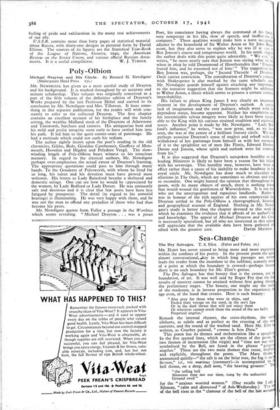Poly-Olbion
Michael Drayton and His Circle. By Bernard H. Newdigate• (Shakespeare Head Press. iss.) Michael Drayton and His Circle. By Bernard H. Newdigate• (Shakespeare Head Press. iss.)
MR. NEWDIGATE has given us a most careful study of Drayton and his background. It is marked throughout by an accurate and minute scholarship. This volume was originally conceived as a part of the fifth volume of the definitive edition of Drayton's Works prepared by the late Professor Hebel and carried to its conclusion by Mr. Newdigate and Mrs. Tillotson. It loses some- thing in this separate publication, for the reader will wish con- stantly to refer to the collected Drayton. The first chapter contains an excellent account of his birthplace and the family setting, the wealthy Midland stock of the Draytons of Atherstone and Tamworth, butchers and tanners. His antiquarian bent and his mild and prolix integrity seem early to have settled him into his path. It led him to the quiet corner-seats of patronage. He had a rectitude which could not curb his tedium.
The author rightly insists upon the poet's reading in the old chronicles, Gildas, Bede, Giraldus Cambrensis, Geoffrey of Mon- mouth, Hoveden and Higden and Polydore Vergil. The slow- winding length of Poly-Olbion bears witness to his tenacious memory. In regard to the classical authors, Mr. Newdigate perhaps over-emphasises the actual extent of Drayton's learning. The appropriate quotations could pass to him through many hands. To the Gooderes of Polesworth, with whom he lived for so long, his talent and his devotion must have proved most welcome. His letters to Lady Rainsford breathe a sheltered and domestic eulogy. One can see how he would be ;.ppreciated by the women, by Lady Bedford or Lady Dorset. He was eminently safe and decorous and it is clear that few poets have been less fatigued by pomposity. The detail (in regard to his armorial bearings) is illuminating. He was very happy with them, and he was not the man to offend any prejudice of those who had thus become his peers.
Mr. Newdigate quotes from Fuller a passage in the Worthies which seems revealing. " Michael Drayton . . . was a pious Poet, his conscience having always the command of his farm, very ve temperate in his life, slow of speech, and inoffensive 4 .1 company." These qualities would make him a most acceptable adjunct to the household of Sir Walter Aston or Sir John Beau. mont, but they also serve to explain why he was ill at ease us Ben Jonson's coarse and tempestuous world. In his tenth chapter the author deals with this point quite admirably. " We can," he writes, " be more nearly sure that Jonson was saying what he felt when in 1619 he told Drummond of Hawthomden that Drayton feared him, and he esteemed not of him.' " The suggestion that Ben Jonson was, perhaps, the " Jocund Throstle ' of Drayton's Owle carries conviction. The consideration of Drayton's contacts with Shakespeare is also marked by the same scholarly care. Mr. Newdigate guards himself against attaching any imponanee to the tentative suggestion that the Sonnets might be addressed to Walter Aston, a thesis which seems to possess a certain intiinsic improbability.
His failure to please King James I was clearly an important element in the development of • Drayton's outlook. A certain lack of imagination and the easy jealousy, which went with his dependent status, become apparent. Neither his simplicities not his interminable sylvan imagery were likely to have been accept able to the King with his curious strained erudition and equivocal tastes. Another point is made by Mr. Newdigate. " Lady Bed ford's influence," he writes, " was now great, and, as we ha seen, she was at the centre of a brilliant literary circle. We ma perhaps associate Drayton's sense of neglect and rebuff with th withdrawal of her patronage from himself or with her extensio of it to the sprightlier set of men like Florio, Edward Herbe Donne and Jonson, whose spirit and outlook were far remor from his."
It is also suggested that Drayton's outspoken hostility to th leading Ministers is likely to have been a reason for his failut with his sovereign. This hostility may, however, have been effect rather than a cause of his inability to make headway in th royal circle. Mr. Newdigate has done much to elucidate th allusions in The Owle, which are sometimes so obvious and oft so recondite. One might hazard the opinion that throughout thi poem, with its many objects of attack, there is nothing hinte that would wound the gentlemen of Warwickshire. It is not th who are the unscrupulous and rapacious landlords. Rather was in honour of the rich squires of his own countryside th Drayton settled to the Poly-Olbion a chorographical, histori and geographical account of England. Nothing in Mr. Newdi gate's study is better than the chapter devoted to this work • which he examines the evidence that it affords of its author's lif and knowledge. The appeal of Michael Drayton and his Gird is necessarily specialised, but all who are interested in this subj will appreciate that the available data have been gathered an


























 Previous page
Previous page